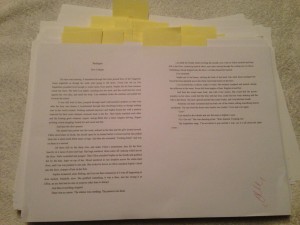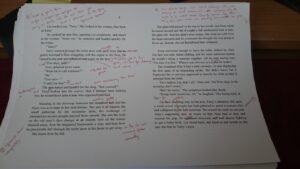Writer’s block.
I suppose since so much has been written about writer’s block, it must exist. I’ve been stuck several times. Most notably in my recent past, I was stuck on how to end The Third Rule. I wrote no less than six endings for that book until I chose the one that felt right. I followed the little rule above (My Way – Part Two), where I selected what was emotionally right for the character as well as the story and eventually it fell out of the keyboard by itself, quite satisfactorily.

You have to know about the scene you’re trying to write, you have to know where you want it to end – by that I mean that each related scene must logically follow on to the next in a chronologically and emotionally accurate manner – not necessarily how it appears in the book, there might be another half dozen scenes featuring different characters in between them – but you have to know what job the scene you’re stuck on is there to perform and work towards it. If you don’t know what its job is, then how can you write it? This is where the flow chart might come in handy for you: it’ll help determine where in the story this particular scene fits, give it a purpose, and give you the tools to crack on and write it.
You only have writer’s block when you don’t know what you’re trying to achieve.

Sadly, I too suffer from this; but my own version of writer’s block is determining what story to write. Now, for instance, I’ve finished Sword of Damocles, and have a few hours to myself. I could slap myself for not using this time more wisely to get on with writing the next Eddie Collins story. Instead, I’m sitting here writing a blog post on how I write. Der!
Editing.
I have several failings as an editor. Firstly, I don’t let the book cool down enough after I’ve finished it. I consider the length of time it took to write the damned thing enough of a time gap in order to go back to the beginning and start editing. I am so very wrong. In almost every case where I’ve read a piece of my ‘edited’ work months after I published it, I have been able to make it better or spot the errors I was blind to back then.
I do not like this. But I justify it to myself thus: Improving a manuscript over time is easy because you are an improved reader and so an improved writer. If I were to live by this philosophy, I would never publish anything. I accept that there will always be areas in which a story can be improved, but you have to stop somewhere, don’t you?

I find it easiest to spot the typos and inconsistencies from a printed version rather than on screen. I’ve pondered this anomaly and cannot think of why it should be so. But it is, I recognise it as a fact, and I always do it this way.
Also, I’m not actually very good at reading. I mean I read like most people do, in that I see what I want to see, so am rubbish at spotting omissions and general errors. I’m extremely lucky in that I have some good friends who not only love reading but who have the eyes of a shithouse rat and excellent mindsight. I am in awe of them.
And there’s another reason why I’m not especially gifted when it comes to editing: when I’ve finished with something, I like to move right along to the next project. This is a failing of mine since a work in progress is not actually finished until it’s actually finished. You get the idea; I’ll resist the urge to waffle on this one further.

But before I leave the Editing section, I let you into a secret foible of mine. I can only edit with a red Bic pen. It also has to have a fine tip, not medium. And if I make notes about the story as I’m reading through it, (and I also do this during the story’s construction) I use a 0.5mm mechanical Staedtler pencil fitted with HB lead, writing on an A5 spiral bound pad. I hate using pen because it looks messy, and I love how the pencil feels in my hand and I adore how it writes, so free and easy. I know, I know, crazy bird!
nice article Andrew, I can empathize as I’ve hit a block recently myself and have resorted to reading what I’ve done already, (though avoiding editing yet) to try and get the juices flowing again.
Thank you, Nav. Very often the only way for me to crunch the gears and get moving again is to edit. Maybe it stimulates the mind and focuses it on the point in hand. Who knows? I hope you do get going again, and when you do, let me know how you did it, I’d be very interested.